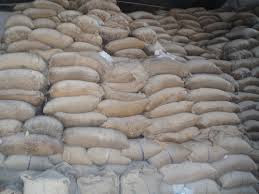Agribusiness, Agriculture, Veterinary Medicine, Cassava, Garri, food security, Agritech and the Red Meat Value Chain.
Showing posts with label feed conversion. Show all posts
Showing posts with label feed conversion. Show all posts
Thursday, March 3, 2016
FEED COSTS AND PRODUCTIVITY.
The Nigerian poultry industry is estimated at ₦80 billion ($600 million) and is comprised of approximately 165 million birds, which pro-duced 650,000 MT of eggs and 290,000 MT of poultry meat in 2013. From a market size perspective, Nigeria’s egg production is the largest in Africa (USDA 2013).
Chicken importation was banned by Nigeria in 2003, which spurred growth in domestic poultry production. Statistics from Eurostat, however, shows that between 2009 and 2011 over 3 million MT worth of poultry products were imported into the Republic of Benin, and these products ending up in the Nigerian market. If this is reflected in overall assumptions, estimated poultry meat consumption in Nigeria is approximately 1.2 million MT.
This smuggled chicken costs about ₦500- ₦700 ($2.50-$3.50) per kg while locally produced frozen chicken costs between ₦1,000- ₦1,300 ($5 - $6.50) at retail locations, and approximately ₦650 ($3.25) at the farm gate. The price differential between imported and locally produced poultry is driven pri-marily by the high cost of maize and soybeans in Nigeria, and wide fluctuations in these commodity prices during the year.
The overview shows the market for poultry and poultry products,and this can be fully harnessed to access the profit potential of the industry. Feed accounts for 65-75% of production cost in livestock,thus strategies to bring down feed costs will spill over on production costs and cost of products.Feeding of livestock must be balanced if adequate growth and development is to be achieved and if products are healthy and wholesome for consumption.
Feeding strategies to elicit growth will hinge on the substitution of certain feed stuff with other alternatives to get same desired growth and wholesome products.The basic components dictating the cost of production are maize and soybeans healthy substitutes have been studied and various inclusion rates experimented to get desired results.
Producers have been known to indulge in various practices to break-even and reach market weight at desired times,but which have detrimental effects on man and even the animals on a long term. The use of growth promoters have been explored to reduce cost of production by increasing the weight of animals so as to attain market size early.
Feed substitutes are the only reliable way to ensure maximum food production and ensure food safety.The other alternatives are use of feed additives, and improved feed conversion techniques such as feed fermentation, provision of forage and other greens for growth.
Wednesday, October 28, 2015
FEEDING BROILERS FOR PROFIT.
 The feeding cost in broiler production accounts for over 70% the cost of production,hence proper feeding and management technique will ensure success in the venture.The feed efficiency also refers to feed conversion ratio is the amount of feed consumed by broiler to produce a unit of flesh.The feed efficiency of broiler is 2:1, that is for every 2kg of feed consumed a kg of flesh is expected.The lower the feed conversion ratio the better the feed efficiency.
FACTORS AFFECTING FEED CONVERSION RATIO.
1) The broiler breeds are bred basically for meat,and the male broilers grow faster than the females.The males utilize the feed properly hence its better to raise males separate from females to save cost.
2)The females given same feed dont grow at same rate,their feed utilization is poor.
3)The age is another factor, after 8weeks the feed conversion ratio becomes poor.The birds consume more feed and they dont grow at expected rate,thus increasing production cost.
4)Nutrition; a balanced ration will stimulate growth,if essential nutrients are missing the feed becomes incomplete.The broiler diet consists of broiler starter which is 24% protein and 3000kcal energy and the finisher has 20% protein and 3200 kcal.If your feed is improperly mixed,the essential nutrients will not be available for growth and development.
Feed that excludes certain nutrients will not ensure growth, and feed with excess salt will not ensure any growth and development.
5) Health of the flock; diseases affect growth and development of the birds.Diseases that affects the intestinal lining will result in mal absorption of feed,thus stunting growth.Disease causing nonabsorption/malabsorption of feed should be prevented.
Common diseases that result in mal absorption such as coccidiosis,enteritis,toxicosis,worms and nutritional deficiency. These diseases are prevented by strict bio security protocols,vaccinations and medications and vitamin supplements.
When all protocols are adhered to then,the venture will be very successful.
The feeding cost in broiler production accounts for over 70% the cost of production,hence proper feeding and management technique will ensure success in the venture.The feed efficiency also refers to feed conversion ratio is the amount of feed consumed by broiler to produce a unit of flesh.The feed efficiency of broiler is 2:1, that is for every 2kg of feed consumed a kg of flesh is expected.The lower the feed conversion ratio the better the feed efficiency.
FACTORS AFFECTING FEED CONVERSION RATIO.
1) The broiler breeds are bred basically for meat,and the male broilers grow faster than the females.The males utilize the feed properly hence its better to raise males separate from females to save cost.
2)The females given same feed dont grow at same rate,their feed utilization is poor.
3)The age is another factor, after 8weeks the feed conversion ratio becomes poor.The birds consume more feed and they dont grow at expected rate,thus increasing production cost.
4)Nutrition; a balanced ration will stimulate growth,if essential nutrients are missing the feed becomes incomplete.The broiler diet consists of broiler starter which is 24% protein and 3000kcal energy and the finisher has 20% protein and 3200 kcal.If your feed is improperly mixed,the essential nutrients will not be available for growth and development.
Feed that excludes certain nutrients will not ensure growth, and feed with excess salt will not ensure any growth and development.
5) Health of the flock; diseases affect growth and development of the birds.Diseases that affects the intestinal lining will result in mal absorption of feed,thus stunting growth.Disease causing nonabsorption/malabsorption of feed should be prevented.
Common diseases that result in mal absorption such as coccidiosis,enteritis,toxicosis,worms and nutritional deficiency. These diseases are prevented by strict bio security protocols,vaccinations and medications and vitamin supplements.
When all protocols are adhered to then,the venture will be very successful.
Subscribe to:
Posts (Atom)
Agribusiness ideas.
Popular Posts
-
Five ways agriculture could benefit from artificial intelligence. Agriculture is the industry that accompanied the evolution of humanity ...
-
Climate change may slowly starve bamboo lemurs.Researchers provide evidence to suggest that as Earth's climate changes, bamboo lemurs ...
-
Cassava: Adding Value for Africa (C:AVA). Cassava or manioc (Manihot esculenta) is a perennial woody shrub with an edible root, whic...
-
Scientists hope using dogs could revolutionise how malaria is detected, enabling doctors to identify it quickly and without invasive ...
-
. The risk of diabetes,stroke and cancer are reduced with intake of bananas. The ripe,unripe and over-ripe bananas play vital roles in h...
-
A research by Eindhoven University of Technology have come up with a super innovation where artificial leaves mimic natural counterpa...
AGRIBUSINESS EDUCATION.
Translate
I-CONNECT -AGRICULTURE
AGRIBUSINESS TIPS.
AGRIBUSINESS.
The Agriculture Daily
veterinarymedicineechbeebolanle-ojuri.blogspot.com Cassava: benefits of garri as a fermented food. Cassava processing involves fermentation which is a plus for gut health. The fermentation process removes the cyanogenic glucosides present in the fres...





